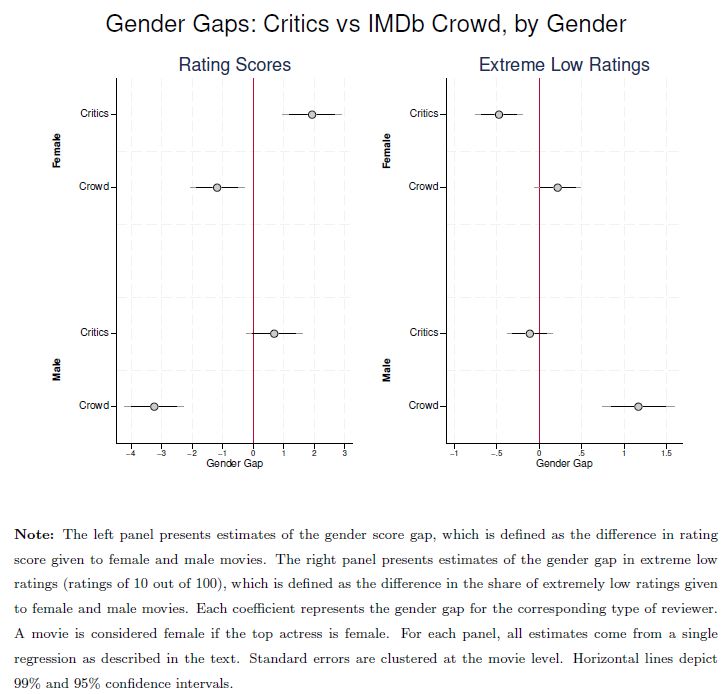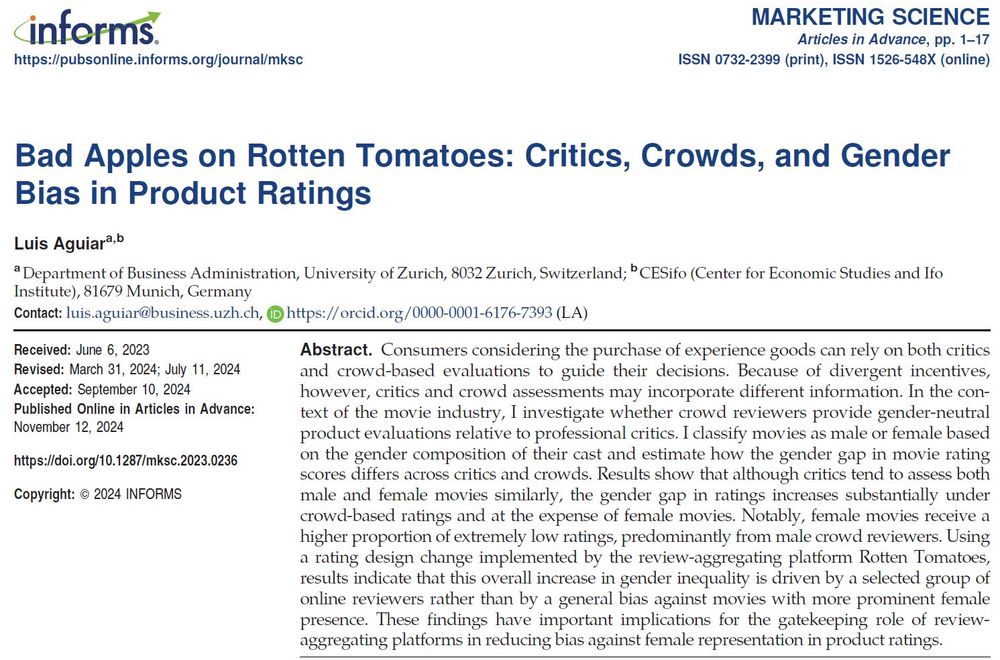
Verified reviewers show no gender bias in their ratings relative to critics, while non-verified reviewers continue to disproportionately penalize female-led films.
This suggests that verification can serve as an effective safeguard against gender biases in crowd ratings.
08.03.2025 21:37 — 👍 2 🔁 0 💬 1 📌 0

In 2019, Rotten Tomatoes introduced one such measure: verified reviews, which can only be posted by users who can prove they watched the movie. So how does the gender gap compare between verified and non-verified crowd ratings? Does it persist among verified reviewers?
08.03.2025 21:37 — 👍 0 🔁 0 💬 1 📌 0
This is bad news, but what can be done? If this bias reflects the behavior of a few malicious reviewers rather than a general trend among the crowds, platforms could implement screening mechanisms to filter out these bad apples.
08.03.2025 21:37 — 👍 0 🔁 0 💬 1 📌 0

Notably, this higher share of extremely low ratings is exclusively driven by male crowd reviewers. When rated by the latter, female movies receive a share of extremely low ratings that is over 50% higher than that of male movies.
08.03.2025 21:37 — 👍 0 🔁 0 💬 1 📌 0


I also explore an alternative gender gap: the difference in the share of extremely low ratings (10 on a 10-100 scale) received by female and male movies. Female-led films again receive a much higher share of extremely low ratings when rated by crowds, but not by critics.
08.03.2025 21:37 — 👍 0 🔁 0 💬 1 📌 0

Using data on 12,657 movies, I focus on the "gender score gap": the difference in rating scores received by women-led and men-led movies. I find that while critics rate both movie types evenly, crowds consistently rate female-led movies lower, both on IMDb and on Rotten Tomatoes.
08.03.2025 21:37 — 👍 0 🔁 0 💬 1 📌 0
Consumers rely on both professional critics and crowds for movie ratings. But while critics have incentives to remain objective, crowd reviewers face no such accountability, enabling malicious reviewers to easily express their animosity on platforms like Rotten Tomatoes or IMDb.
08.03.2025 21:37 — 👍 0 🔁 0 💬 1 📌 0


🎬 Great news: Female leads in top-grossing films have recently hit historic highs!
But what if female-led movies face hidden bias in online ratings? In a recent study, I uncovered troubling gender bias on platforms like Rotten Tomatoes and IMDb... 🧵🍿
08.03.2025 21:37 — 👍 11 🔁 3 💬 1 📌 0
Associate Professor at Carnegie Mellon University (Heinz College). Interested in Platforms and Technology. Previously, Post Doc at MIT and PhD student at Toulouse School of Economics. Website: https://sites.google.com/view/ananyasen/home
Marketing Professor at Kelley School of Business, Indiana University
https://sarangsunder.com/
We organize the Digital Economy Workshop and the Virtual Digital Economy Seminar
http://digitalecon.org
#VIDEseminar
Professor (Digitization, Innovation, Intellectual Property) at HEC Lausanne
Digitization, Assistant Professor of Economics @dice-hhu.bsky.social, https://reinholdkesler.github.io/
PhD Candidate in Business Economics at KU Leuven & 'pre' PostDoc at Uni Zurich. Interested in digital and media economics. https://sites.google.com/view/maritafreimane
Research in applied microeconomics, labor, innovation, and economic history.
https://www.mlubczyk.com/
Tennis player, alpine & nordic skier, triathlon participant,
Associate Professor of Strategy & Business Econ @Cornell. Former Husky, Gopher, and Cornhusker
IO and Law&Economics. Associate professor of economics at U of Mannheim & ZEW Mannheim. Research on innovation, competition, and privacy. Dad of 2.
Assistant Professor of Information Systems at Rotterdam School of Management. Interested in Digitization and AI. Also chess :) https://sites.google.com/view/dainiszegners
Professor of Interactive Intelligent Systems @ University of Salzburg. Co-lead of focus area "InterMediation. Music—Effect—Analysis" @ Wissenschaft & Kunst. #recsys, #fairness, #hci, #evaluation.
https://christinebauer.eu
Professor of digital innovation strategy @Cornell
Interested in decarbonization innovation
Associate professor at UCLA Anderson, works on IO, marketing etc. Temporary Parisian.
bretthollenbeck.com
Economics + Applied AI, Prof at University of Chicago Booth School of Business. Formerly: Carnegie Mellon, UCSD, Northwestern.
Website: www.aleximas.com
Economics Professor at CEMFI.
https://gllobet.github.io/
Postdoctoral researcher at ETH Zurich, I study competition and innovation.
https://www.jeremie-haese.com/
Assistant Professor of IS at Nova SBE
Economist at Cornell studying competition and innovation, digital markets, and the economics of information. Go Heels and Hoos.
benleyden.com
Economist interested in the economics of digitisation, platforms and data. JRC Sevilla & U of Manchester. More info:
carloreggiani.eu











